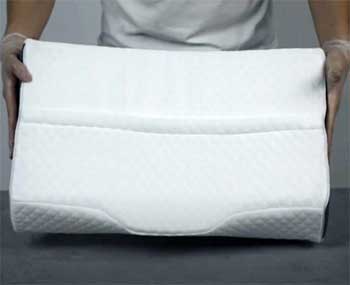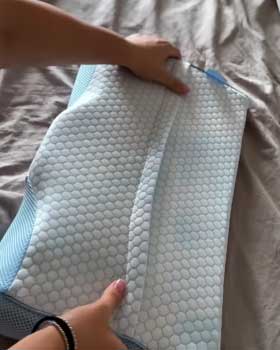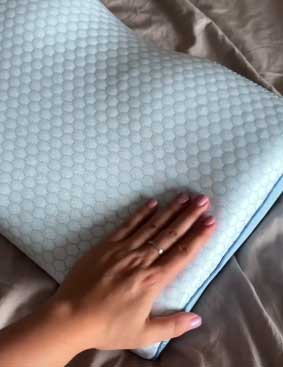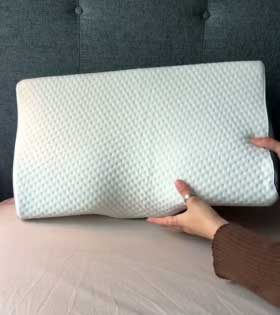I’ve noticed a lot of buzz lately about the Derila Pillow. If you’ve been searching for a memory foam pillow that claims to offer premium comfort, proper alignment, and relief from neck or back aches, you might have considered snapping one up.
It’s promoted as a top-tier product with a butterfly shape and high-quality memory foam that supposedly helps you fall asleep faster and wake up pain-free. At first glance, it seems like a good buy if you’re serious about restful nights and improved posture.
In this review, I want to share my in-depth findings, discuss user feedback, and help you decide if it’s worth trying.
My Personal Journey With Pillows

When I started shopping for a new pillow, I was determined to find something that would solve my chronic neck stiffness.
Like many of you, I read countless reviews online, weighed the pros and cons of different brands, and even asked friends for recommendations.
I was intrigued by the brand’s claims that the Derila Pillow helps keep you cool at night, supports your head in a way that reduces snoring, and is gentle on sensitive skin.
Its hype soared: I saw it plastered on multiple online shops with marketing that touted a “premium memory foam design” and a “unique butterfly shape.”
My expectations were high. Initially, I reasoned that maybe a specifically contoured design would help me enjoy a more restful sleep without feeling that strain in my neck each morning.
So I decided to give the Derila a fair shot, curious to see if I’d wake up with a happier body or if it would just be another pillow collecting dust in my closet.
Understanding The Claims of Derila Pillow
The folks behind the Derila Pillow highlight several key features meant to set their product apart from the typical pillows on the market. Their statements emphasize:
- A butterfly shape that they say provides superior support, potentially helping you fall asleep quicker and stay asleep longer.
- The use of memory foam, which is said to be fully natural, breathable, and capable of maintaining optimal comfort while regulating your temperature throughout the night. Supposedly, this means you won’t experience any sweaty discomfort.
- High-quality materials that are claimed to be free from harmful chemicals, minimizing the risk of allergic reactions.
- A level of firmness that’s designed to keep you fully supported wherever you decide to take a nap or get a full night’s rest.
I recall reading about these benefits and feeling excited. It almost sounded too good to be true, and I was eager to test these claims myself. Many companies promise temperature control, so I wondered if I’d feel cooler compared to my old pillow. That’s a real concern for me, especially on warm nights.
First Impressions of Derila Pillows

When I first unpacked the Derila Pillow, I immediately noticed it wasn’t as big as I’d envisioned.
The packaging was straightforward, and the pillow was rolled or slightly compressed.
Once I let it expand for a while, it regained its supposed shape, but again, I found it smaller than my standard pillows.
I was a bit skeptical about how such a seemingly compact design could provide the right amount of support.
Placing it on my bed, I couldn’t help but compare it to other brands’ memory foam pillows I’d previously tried.
Initially, the foam felt quite dense to the touch, which I took as a positive sign.
I enjoy a bit of firmness to help me maintain good alignment. At the same time, I was hoping it wouldn’t end up feeling rock-hard.
- The Butterfly Shape and Its Purpose
There’s a big marketing emphasis on the pillow’s butterfly shape. In theory, this shape is supposed to cradle your neck and align your head whether you’re a back sleeper or side sleeper.
The edges have slight contours, and there’s a central part that dips a bit for your head to rest. This unique contouring is meant to distribute weight evenly, lessen pressure on your neck, and help alleviate stiffness or muscle strain.
I personally appreciate the idea of a carefully contoured pillow because my neck tension usually grows worse if I sleep on something that’s either too high or too flat. The logic behind the butterfly design is sound: cradle and support.
However, during my first nights with the Derila, I wasn’t entirely sure if I was positioning my head correctly. The pillow felt oddly small under my head, and I found myself wondering if I needed another pillow underneath just to lift me to a comfortable level.
- Memory Foam Feel and Temperature Control
Memory foam has a reputation for contouring around your head and neck, yet some memory foam pillows can run hot. Since Derila’s marketing claims it’s breathable and helps you stay cool, I paid special attention to how hot or cold I felt at night.
I live in a climate that gets quite warm, so night sweats are a genuine concern for me.
I did notice the pillow wasn’t trapping heat as much as some of my older memory foam pillows. It’s possible the design and materials used might have improved airflow.
However, whether or not it’s “completely natural and breathable” is something I can’t fully confirm. It is memory foam, after all, and memory foam can still get a bit warm if the room temperature is high or if you sleep with a heavy blanket.
- Durability and Craftsmanship
The company states that Derila is crafted from premium materials without harmful chemicals. Holding it in my hands, I noticed the stitching was neat, and the overall build felt decent.
There weren’t any unpleasant odors, which can be a deal-breaker for some. I’ve had pillows arrive with a strong chemical smell that takes days to dissipate, but that wasn’t the case here.
Over a few weeks, it did seem to maintain its shape, although I read multiple online comments mentioning that over time, the pillow might flatten or not be as springy as when it was brand new.
Personally, I didn’t use it long enough to see a drastic flattening, but I always consider memory foam something that can degrade eventually, especially if you’re sleeping on it nightly.
My Personal Comfort Assessment

After spending a couple of weeks with the Derila, I found that my neck strain wasn’t significantly better than when I used my old memory foam pillow.
The initial support felt okay, but something about the overall shape and size didn’t align perfectly with my body.
I also tested it for side-sleeping and back-sleeping positions, and neither gave me that sense of “perfect fit” that I was hoping for.
I don’t usually snore, so I can’t speak to whether it helps reduce snoring for individuals who do.
A handful of users online said that it did nothing for their partner’s snoring, which might indicate it’s not a miracle fix in that department.
If you’re dead set on a pillow for snoring relief, you might want to focus on pillows specifically designed for that.
Pros of the Derila Pillow
- May Offer Some Cooling: Compared to some older memory foam pillows, I did notice less heat buildup, so it might be more breathable than certain competitors.
- Lightweight and Travel-Friendly: Because it’s not very large, it could be useful if you’re traveling. It’s easy to pack without taking up too much space.
- Possible Neck Support: If you prefer a relatively flat and contoured pillow, you might find it suits you. Some people mention it helped them maintain a better sleeping posture.
Cons of the Derila Pillow
- Size Discrepancies: Many users, myself included, felt it was smaller than advertised. Some people didn’t like needing an additional pillow to prop them up.
- Lack of Snoring Solutions: Despite being marketed as a way to reduce snoring, multiple reviews indicate it doesn’t fulfill that promise consistently.
- Potential Customer Service and Return Hassles: Based on user reports, if you’re unhappy with your purchase, returning it could be complicated and potentially expensive, especially if you need to ship it internationally.
- Comfort Varies: Pillows are extremely subjective, and the specific contour design might not work for everyone’s head and neck shape.
Maintaining And Caring for the Derila Pillow
Even if a pillow isn’t perfect, taking proper care of it will ensure it lasts as long as possible. From what I’ve gathered:
- Air It Out: When you first receive any memory foam pillow, let it breathe outside the packaging. This helps any initial odors dissipate.
- Use a Pillowcase: Even if the product has a removable cover, using an additional pillowcase will protect it from sweat and spills.
- Spot Clean Only: Memory foam typically shouldn’t be submerged in water. If you need to clean it, just use a damp cloth or mild detergent to spot-treat the foam.
- Keep It Dry: Avoid storing or using the pillow in very humid conditions. Moisture can accumulate in the foam and create problems.
- Rotate Usage: Some people like rotating their pillows or flipping them occasionally to maintain shape and distribution of wear.
A Realistic Take on Brand Claims

When a pillow brand markets itself as the “ultimate solution,” I’m always a bit cautious. Pillows, like mattresses, are highly personal.
Yes, memory foam can mold to your shape and help with alignment, but it won’t be a miracle cure for everyone.
Additionally, claims about snoring relief can be misleading because snoring can stem from multiple factors such as anatomy, sleeping position, sinus issues, or weight.
No single pillow can fix all that.
Derila’s hype stems from heavy online marketing and influencer promotions.
But with the variety of negative experiences, it’s clear that not everyone is walking away satisfied. If you’re on a strict budget, or if you prefer large pillows, you might be disappointed.
If you have the option to test it in person (which many of us do not, since it’s largely sold online), that would be ideal. But shipping complications mentioned in user reviews are a red flag to me.
Who Might Actually Benefit From It?
Despite the caution, there might be a subset of people who can adapt well to the Derila. If you’re someone who:
- Likes a smaller pillow that you can take on trips,
- Prefers a thin, contoured design instead of a plush or high-loft pillow,
- Doesn’t rely on it as a sole measure for snoring relief,
- And you’re willing to risk a complicated return policy,
…then maybe this pillow is still worth a try. However, given the wide range of alternative memory foam pillows on the market, I wouldn’t blame you for exploring other brands first.
My Overall Impression of Derila Pillow
I’m personally not convinced that the Derila Pillow provides a standout sleeping experience worth its marketing claims. It feels like an average memory foam pillow with a special shape that some might find comfortable.
It’s not terrible in terms of basic quality, but it also didn’t revolutionize my sleep or solve any significant issues. When factoring in the potential hassles with returns, shipping, and the strongly mixed reviews, my inclination is to recommend caution if you’re considering it.
If you’ve stumbled on multiple sites praising Derila, you may want to read user feedback carefully and think about your personal pillow preferences before buying. I’ve come across too many negative user experiences for me to wholeheartedly advocate for it.
It could potentially suit a small group of users, but it’s risky if you need a hassle-free return or have strong preferences about pillow size and height.
Why You Might Look Elsewhere?
If you’re someone who wants a pillow that is guaranteed to be easy to return if you’re dissatisfied, you might consider more established brands with a robust return policy. Some big retailers offer memory foam pillows and allow you to bring them back to a physical store or mail them domestically, which is simpler than dealing with international shipping. Also, if you rely on product images for sizing expectations, you might be disappointed by Derila’s real-life dimensions.
You might also be skeptical if the marketing focuses heavily on snoring relief. In my research, I discovered that the success rate for pillows addressing snoring specifically is quite variable. Some specialized pillows help keep your airways open, but that’s not a universal fix.
Exploring Other Options For A Better Night’s Sleep
If, like me, you’ve been on a quest for the perfect pillow, here are some general tips you might find useful:

- Identify Your Sleep Position: Back sleepers may prefer a flatter pillow with neck support, while side sleepers might need a thicker, contour pillow to fill the gap between neck and mattress. Stomach sleepers often do best with something extremely thin or no pillow at all.
- Material Preferences: Memory foam is just one material. You could try latex, buckwheat, down, or other materials. Each has its pros and cons.
- Trial Period: Many reputable pillow brands offer a trial period. This can be crucial since you won’t know if the pillow truly suits you without sleeping on it for at least a couple of weeks.
- Return Policies: Check how easy or hard it is to return or exchange. That can make a huge difference if you discover it’s not a match.
- Seek Professional Advice: If you have serious neck or back issues, consulting a chiropractor or physical therapist can give you tailored pillow recommendations.
Shortcomings In Manufacturer Support
One thing that bothers me is the approach to returns. I empathize with the folks who accidentally purchased too many pillows or realized too late that it wasn’t as advertised. Being asked to cover expensive international shipping is off-putting when a brand positions itself as customer-centric.
I wish there was a more transparent policy in place that ensures potential buyers know what they’re getting into.
If you were to buy the Derila, I’d strongly advise reading all the fine print on the website, maybe taking screenshots, and ensuring your order quantity is correct before hitting the purchase button. Also, note that user reviews mention packages shipping from within the United States, but returns going back overseas, which seems like a logistical nightmare.
Are Marketing Claims Overblown?
Online marketing can sometimes go over the top. Terms like “premium,” “ultimate support,” or “best pillow in the world” are easy to throw around without tangible proof.
While memory foam pillows can indeed be supportive, I’ve seen a pattern where customers feel misled by the actual quality or size. I urge anyone considering Derila to rely less on marketing hype and more on personal experience or in-depth user reviews that provide specifics.
Some brand ambassadors or affiliates might only highlight the positive angles, ignoring the negative. That’s why reading actual negative or neutral reviews can be so valuable. If a product is frequently criticized for the same reasons—size, comfort, and return issues—it likely signals a consistent shortcoming.
Comparing Derila With Other Brands
- Derila Pillow Vs. Dreamy Foam Pillow
When I first compared the Derila Pillow to the Dreamy Foam Pillow, the most noticeable difference was the size.
The Dreamy Foam Pillow tends to come in standard, well-defined dimensions, whereas some users complain the Derila can feel smaller than expected.
If you like a pillow that’s more generous in size, the Dreamy Foam might be the safer bet.
Another area where they differ is in their overall firmness. The Derila leans toward a denser, contour-focused design that can feel quite rigid if you prefer a little give.
Meanwhile, the Dreamy Foam Pillow often strikes a balance between support and softness.
You might find the Dreamy Foam is friendlier for a broader range of sleeping positions—back, side, or stomach—since it’s not too tall or too flat.
In terms of breathability, the Derila claims to offer a sweat-free experience, but I noticed the Dreamy Foam Pillow’s ventilated foam also does a decent job of preventing overheating. Price-wise, the Dreamy Foam can sometimes be cheaper, though exact costs vary.
If you need reliable sizing and moderate support, you might lean toward the Dreamy Foam, whereas you’d pick the Derila if you want a thinner, contoured product that might fit certain neck shapes better.
- Derila Pillow Vs. Dosaze Pillow
When weighing the Derila against the Dosaze Pillow, the first thing I noticed is Dosaze’s reputation for neck and spinal alignment.
Both pillows use memory foam, but Dosaze typically features an ergonomic dip or curvature that’s meant to cradle your head, much like Derila’s butterfly design.
However, Dosaze is often praised for its more consistent firmness throughout the pillow, which can be reassuring if you like uniform support.
The Derila, on the other hand, draws mixed feedback for the actual height and contour placement. Some people love how the butterfly edges can cradle the neck, while others think it’s too flat in the center.
Meanwhile, Dosaze seems to cater to people who switch between side and back sleeping positions without feeling like their head is too low or too high.
As for overall feel, the Dosaze can feel slightly softer and more forgiving. The Derila might feel a bit dense at first, which you may or may not enjoy. Dosaze also tends to come with a more straightforward return policy compared to the complaints about Derila’s potentially complicated international shipping.
If you prioritize hassle-free returns and a gentler memory foam experience, Dosaze might emerge as the more practical choice.
- Derila Pillow Vs. Eden Pillow
Comparing the Derila Pillow with the Eden Pillow is interesting because the Eden Pillow often stands out for its adjustable fill.
This means you can add or remove shredded memory foam to get the loft just right for your personal preference.
In contrast, Derila’s shape and firmness are fixed, so if it feels too flat or too high, you don’t have many options to tweak it.
People who prefer a pillow that can change with their sleep habits often favor the Eden Pillow. If you move between sleeping on your side and back throughout the night, you might like having the option to modify the filling.
The Derila’s butterfly contour is meant to solve alignment issues, but if the shape doesn’t match your body, you might be stuck.
Also, Eden Pillow typically wins points for consistent customer support, while Derila has drawn criticism for return and refund complications.
Though Eden might be pricier depending on the retailer, the ability to tailor your pillow—and potentially send it back with fewer hassles—might outweigh any cost difference. If easy customization and solid support are what you need, Eden could be a stronger contender than Derila.
Frequently Asked Questions (FAQ)
From what I’ve gathered in user forums and limited official information, the Derila Pillow appears to be associated with a company that ships from multiple locations, including the U.S. However, there are references to returns needing to be mailed back to Lithuania, which suggests that manufacturing or central fulfillment might originate there or nearby. The exact country of origin is not always clearly stated, but Lithuanian addresses are frequently mentioned in the context of returns.
Oprah has often praised premium bedding brands, and while she hasn’t specifically endorsed Derila in any of her well-known lists, she has talked about certain luxury pillows made from high-quality materials. Over the years, Oprah’s recommendations have included pillows from reputable, long-standing brands known for comfort and quality, such as some down pillows or carefully curated memory foam options. It’s always worth consulting her most recent favorite-things list to see if she’s highlighted any specific pillow brand.
Many chiropractors lean toward pillows that maintain proper cervical alignment. Memory foam and latex pillows can be popular due to their ability to mold around the neck’s curvature, offering personalized support. However, the preferred height and firmness can differ based on whether you sleep on your back, side, or stomach. Chiropractors often recommend trial and error to find a pillow that feels supportive yet comfortable. Some also suggest contour pillows that match the arch of your neck, but the brand can vary widely.
The advertised benefits include:
1. Contoured “butterfly” shape that aims to keep your head and neck aligned, possibly reducing muscle strain.
2. Breathable memory foam that may keep you cooler than some older or less advanced foam products.
3. Firmness intended to provide consistent support rather than sinking excessively.
4. A lightweight design that you could bring along when traveling.
Still, as noted in user reviews, these benefits may not apply equally to all individuals.
Wrapping Up
After testing the Derila Pillow, reading through countless user experiences, and comparing it to other options, I personally wouldn’t recommend rushing to buy it. The butterfly shape might feel supportive for some, but the smaller-than-expected dimensions and tricky return process are significant drawbacks.
If you truly want to test out memory foam contour pillows, there are brands with friendlier policies and clearer sizing. At the end of the day, your comfort and peace of mind matter most. Don’t settle for a pillow that might not deliver on its promises, especially if returning it becomes an uphill battle.



